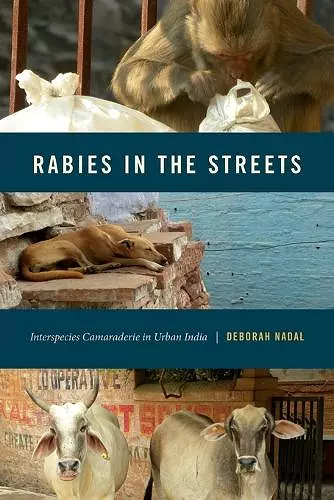Rabies in the Streets
Interspecies Camaraderie in Urban India
Format:Paperback
Publisher:Pennsylvania State University Press
Published:16th Apr '21
Should be back in stock very soon

Found in two-thirds of the world, rabies is a devastating infectious disease with a 99.9 percent case-fatality rate and no cure once clinical signs appear. Rabies in the Streets tells the compelling story of the relationship between people, street animals, and rabies in India, where one-third of human rabies deaths occur. Deborah Nadal argues that only a One Health approach of “interspecies camaraderie” can save people and animals from the horrors of rabies and almost certain death.
Grounded in multispecies ethnography, this book leads the reader through the streets and slums of Delhi and Jaipur, where people and animals, such as dogs, cows, and macaques, interact intimately and sometimes violently. Nadal explores the intricate web of factors that bring humans and animals into contact with one another within these urban spaces and create favorable pathways for the transmission of the rabies virus across species. This book shows how rabies is endemic in India for reasons that are as much social, cultural, and political as they are biological, ranging from inadequate sanitation to religious customs, from vaccine shortages to reliance on traditional medicine.
The continuous emergence (and reemergence) of infectious diseases despite technical medical progress is a growing concern of our times and clearly questions the way we think of animal and environmental health. This original account of rabies challenges conventional approaches of separation and extermination, arguing instead that a One Health approach is our best chance at fostering mutual survival in a world increasingly overpopulated by humans, animals, and deadly pathogens.
“In this fascinating, accessible, and well-written text, Nadal considers various conceptualizations of rabies in India and the multidimensional challenges involved in controlling viral transmission within a One Health framework.”
—D. A. Brass Choice
“A truly original book and a fascinating read.”
—Harlan Weaver Medical Anthropology Quarterly
“Nadal’s recent book stands as an exemplar of the relevance of rich, detailed ethnography for understanding complex public health issues. It is especially relevant at the present moment, when it is becoming increasingly important to rethink public health in recognition of the multispecies and environmental dimensions that shape the conditions of health, well-being, and disease.”
—Hannah Brown Journal of the Royal Anthropological Institute
“This is one of the best ethnographies on human-nonhuman relationships I have read.”
—Sushrut Jadhav, founding editor of Anthropology & Medicine
ISBN: 9780271085968
Dimensions: 229mm x 152mm x 20mm
Weight: 408g
278 pages